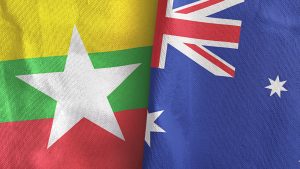Australia has chosen to downgrade its diplomatic presence in Myanmar so as not to legitimize the country’s military junta, deepening the latter’s diplomatic isolation.
According to a report earlier this week by the ABC, Australia’s Department of Foreign Affairs and Trade (DFAT) has selected a “senior career officer with ambassadorial experience in the region” to succeed former ambassador to Myanmar, Andrea Faulkner, who wrapped up her term in April. As per the ABC report, the new appointee “will not present her credentials to the head of the junta, and will instead operate as the head of mission with the title of chargé d’affaires.”
The military administration led by Senior Gen. Min Aung Hlaing has exercised a shaky hold on Myanmar since taking power in a coup in February 2021. Since then, the country has descended into a multi-sided conflict pitting the embattled Myanmar military, or Tatmadaw, against the National Unity Government (NUG), which represents the ousted civilian government and its allies, the scores of People’s Defense Forces that are aligned with it, and the ethnic armed groups that have fought for autonomy for decades. A Myanmar-based research group reported last week that more than 5,600 civilians have been killed in Myanmar since the coup.
Australia joins a growing number of nations that have chosen to downgrade their relations in the 16 months since the group. While none has chosen to break off diplomatic relations and switch their recognition to the NUG, which claims with sound basis to represent Myanmar’s legitimate and duly elected government, foreign governments are doing the next best thing.
According to a recent report by Nikkei Asia, Denmark, Germany, Israel, Italy, and South Korea have also downgraded, or are in the process of downgrading, their diplomatic representation to chargé d’affaires level. European Union countries have informally agreed not to send ambassadors to their Myanmar missions, the report stated, citing Brussels-based diplomats. New Zealand, too, has suggested privately that it will not replace its current ambassador to the country.
Meanwhile, the United Kingdom’s new ambassador to Myanmar, Pete Vowles, appointed last August, remains stranded in Bangkok after the military administration refused to issue him a visa, angered by London’s decision to downgrade his title from ambassador to chargé d’affaires. The U.K. appointment is particularly sensitive for the junta, given that London has refused to forcibly evict Kyaw Zwar Minn, a former ambassador who has pledged his support to the NUG, from the ambassador’s official residence. (However, it has quietly urged the envoy to find alternative housing arrangements.)
Even some fellow members of the Association of Southeast Asian Nations (ASEAN) have modulated their diplomatic approach to the military administration. According to Nikkei’s report, Brunei has recalled its ambassador and appointed the head of mission to carry out his duties, while Malaysia’s envoy has been recalled for being out of step with the government’s increasingly hard line on the junta.
Canberra’s move marks a noted stiffening of Australia’s position toward the military junta. Long a paragon of pragmatic engagement in Southeast Asia, the country’s government has come under strong criticism for choosing not to impose harsh sanctions on the Tatmadaw since the coup, and for otherwise appearing to lend legitimacy to the regime. In early April, Australia’s outgoing ambassador Andrea Faulkner caught flak after she become the first Western envoy to meet junta leader Min Aung Hlaing in person, an encounter that was trumpeted in the state-owned New Light of Myanmar, which claimed the pair discussed the “enhancement of cooperation in various sectors.”
Manny Maung of the advocacy group Human Rights Watch described the meeting as “deeply unacceptable.” A DFAT official said later that the ambassador had used the meeting to reiterate calls for Myanmar to cease violence and release detainees.
Part of the reason for Australia’s cautious approach so far has been to maintain a line of communication with the junta in order to secure the release of Australian economist Sean Turnell, an economic adviser to the ousted National League for Democracy government who was arrested during the coup and has been in detention ever since.
The move, which deepens the diplomatic isolation into which Myanmar has once again sunk since the coup, has been applauded by the junta’s opponents. Dr. Tun-Aung Shwe, who represents the NUG in Australia, told the ABC that it was “particularly welcome that the Australian Government understands this situation well and avoids conveying any sense of legitimacy to military rule in Myanmar.”

































